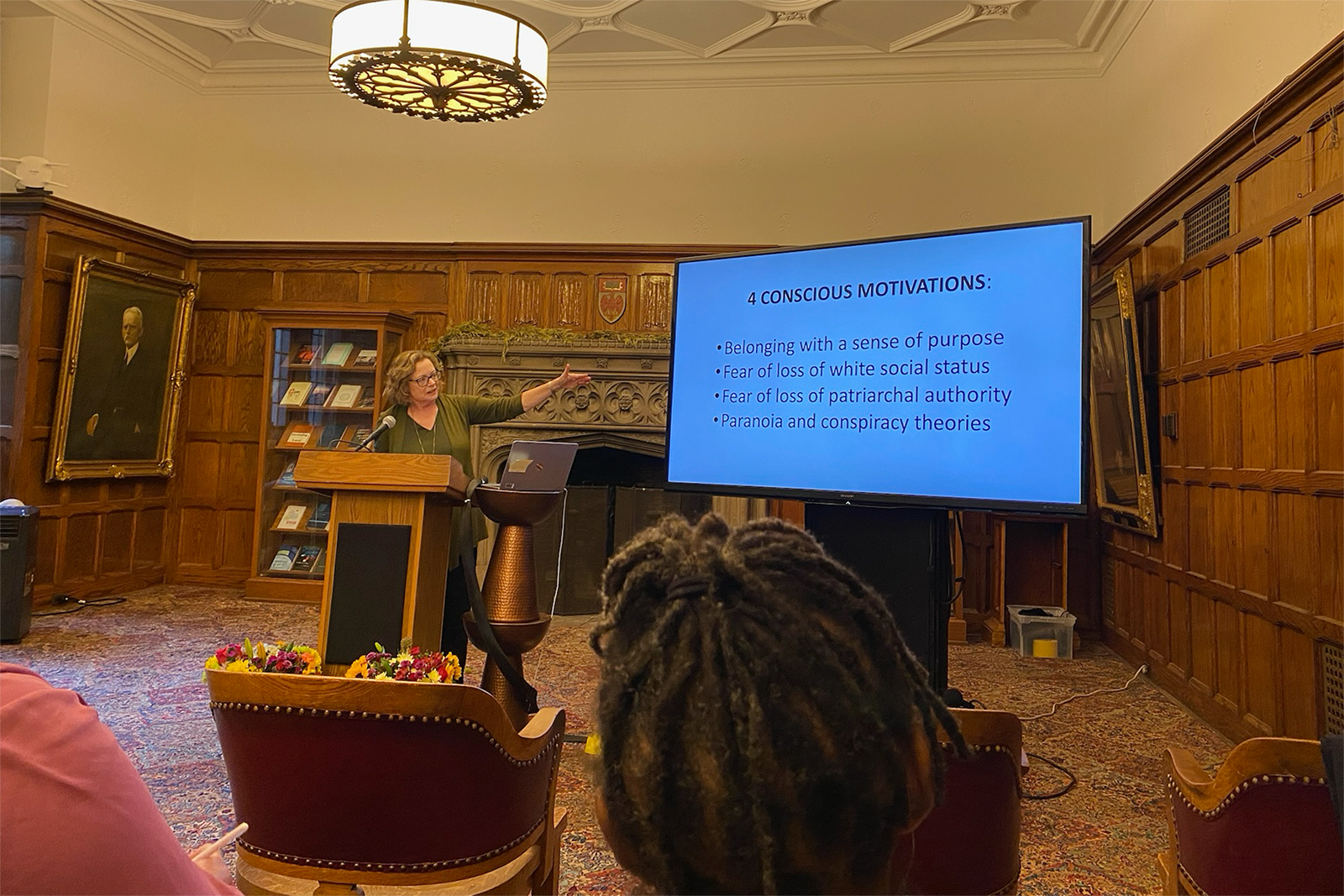
CHICAGO (RNS) — The International Association for Spiritual Care met in Chicago for its annual conference from July 20-22, under the theme “spiritual care as resistance,” which focused on how to address the current political moment through the field’s expertise.
About 50 people attended the conference, both in person and online, including pastoral care scholars, hospital chaplains and clergy. The attendees from at least four continents represented a variety of faith traditions, including Christianity, Judaism, Islam, Buddhism, paganism and those of no religion.
In contemplating spiritual care as resistance, speakers covered topics from religious trauma and how to heal it, to how spiritual care can be used for groups rather than just individuals, to how to embody one’s values of care and justice when they go against a larger system. While IASC has an international focus, many panelists referenced the current political moment in the United States throughout the conference.
The Rev. Pamela Cooper-White, IASC founding member and former president, set the tone with her public lecture on Sunday evening titled, “Spiritual Care as Resistance: Christian Nationalism, White Supremacy, and the Rise of Authoritarianism.”
“This is probably the angriest talk I’ve ever given,” she said. “U.S. President Donald Trump and his loyalists have taken a wrecking ball to virtually everything touching on racial, gender and climate justice that most, if not all, of us here have worked on for decades. And the consequences are dire and potentially long-lasting.”
Cooper-White’s 2022 book, “The Psychology of Christian Nationalism: Why People Are Drawn In and How to Talk Across the Divide” was featured heavily in her lecture as she unpacked how she sees Christian nationalism affecting the American political landscape. She concluded with a call to action.
“The current escalating racist attacks on immigrants and people of color, LGBTQ persons, and the blatant reversal of environmental protections, call us to consider spiritual care as resistance,” she said. “We have engaged personally in practices of resistance in our own communities, but we perhaps need more collective, political and policy-oriented action. … As an international and explicitly interreligious organization, we as members of IASC have the knowledge and the power collectively to make a more public witness against all that we see is eroding the cultural and religious values that undergird our work of care.”
Spiritual care, sometimes referred to as pastoral care, has many overlaps with therapy or counseling, both taking place in a one-on-one setting between a care seeker and provider. However, instead of caring for one’s mind like in therapy, spiritual care focuses on one’s soul, centering the care seeker’s personal lived theology. Historically, most think of chaplains or those who commonly work in hospitals, prisons and with the military as performing this work. But spiritual care is also central to the work of spiritual directors and most clergy.
IASC, which was founded in 2015 in Bern, Switzerland, aims to enhance the capacities of spiritual care scholars and practitioners in acquiring, disseminating and applying knowledge of theory and practice of the field, and emphasizes interdisciplinary, interreligious and intercultural scholarly investigation, according to its mission statement.
The group began as a nonprofit, but in 2023, the board decided to drop its nonprofit status. Since then, it has operated as a volunteer-only organization. The board members at the time of the switch realized that what the association was best at was putting on the annual conference and creating books from the content, Cooper-White said. They wanted to make the annual conferences their focus, rather than collecting members and dues.
One of IASC’s books is “What Is Spiritual Care?” in which contributors in various caregiving professions, religious traditions and cultural contexts offered their answer to the question. “The cumulative impact of this work emphasizes that spiritual care is inseparable from larger efforts towards justice and peacemaking,” IASC said of the book on its website.

The Rev. Cynthia Linder, from left, leads a panel discussion on the book, “What Is Spiritual Care?” with Rabbi Mychal Springer, the Rev. Pamela Cooper-White, Daniel Schipani, president of IASC, and Mahmoud Abdallah, Tuesday, July 22, 2025, in Chicago. (Photo by Rachel Berkebile)
Members of the IASC board, including its president, Daniel Schipani, and contributors to the book spoke about the question on a panel, discussing the importance of and challenges around their attempts to maintain a broad, international and interfaith definition of spiritual care.
Each speaker on the panel offered their definition of spiritual care. Rabbi Mychal Springer, who founded the Center for Pastoral Education at Jewish Theological Seminary in New York City, said spiritual care is the “work of sustaining people in the spirit.”
Schipani’s definition included spiritual care as “a compassionate response to human suffering.” While Mahmoud Abdallah, an academic staff member at the Center for Islamic Theology at the University of Tübingen in Germany, said the field of spiritual care “is still open to design.” The panelists seemed to agree on the importance of community in doing the work of pastoral care and that it is not work that can be done alone.
